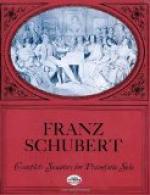Dussek, born in the year 1761, studied first with his father J.J. Dussek, and in his twenty-second year received further instruction from Emanuel Bach; he soon enjoyed great fame as an executant. Tomaschek, himself a pianist of note, thus speaks of him in his autobiography:—
“There was, in fact, something magical about the way in which Dussek, with all his charming grace of manner, through his wonderful touch, extorted from the instrument delicious and at the same time emphatic tones. His fingers were like a company of ten singers, endowed with equal executive powers, and able to produce with the utmost perfection whatever their director could require. I never saw the Prague public so enchanted as they were on this occasion by Dussek’s splendid playing. His fine declamatory style, especially in cantabile phrases, stands as the ideal for every artistic performance—something which no other pianist has since reached.”
The above quotation refers to a concert given at Prague in 1804.
There is, unfortunately, great confusion in the opus numbers of Dussek’s works; and, moreover, it is difficult, if not impossible, to give the dates either of composition or publication. Breitkopf & Haertel have published more than fifty sonatas, but we shall only refer to some of the more important ones. Dussek, like all the prominent composers of his time, not even excepting Haydn and Mozart, wrote music on a practical, rather than on a poetical basis; one of the letters given above acknowledges this in very frank terms. But to Dussek’s credit be it said, his least valuable works are masterpieces as compared with those which the sonata-makers, Steibelt, Cramer, and others, fabricated by the hundred. In Dussek we find great charm and refinement, while the writing for the instrument is often highly attractive; but the art of developing themes was certainly not his strong point. That he was at times careless or indifferent may be seen from such a bar as the following (Op. 47, No. 1, Litolff ed.; Adagio, bar 9):—




